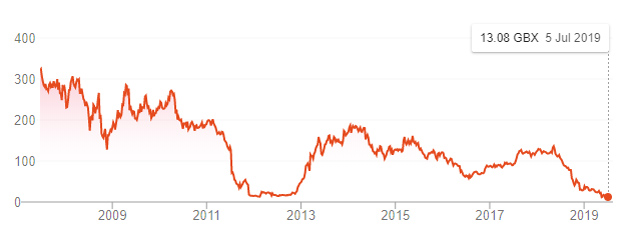More: Thomas Cook in £750m rescue deal with Fosun
Chinese group in driving seat with banks, says Travel Weekly’s Ian Taylor
Thomas Cook’s announcement that is in “advanced discussions” with its “core lending banks” and largest shareholder Fosun Tourism Group confirms what Travel Weekly previously outlined as the likely route to its survival.
Assuming all now goes to plan, Fosun will inject enough capital to take a controlling stake in Thomas Cook’s tour operating business and a “significant minority interest” in Cook’s airlines.
A debt-for-equity swap by the banks will see these acquire majority control in the airline, at least for now, and some of the tour operator business with all that goes with it, including the retail outlets.
Podcast: What next for Thomas Cook?
Thomas Cook might then be taken private or remain with a minority of shares publicly listed.
Thomas Cook described the deal under discussion as comprising “a substantial new capital investment as part of a proposed recapitalisation and separation of the group”.
This would inject “£750 million of new money” providing “sufficient liquidity to trade over the winter 2019-20 season and the financial flexibility to invest”.
Thomas Cook noted its banks “are supportive” and the discussions “constructive”.
Naturally, “existing shareholders will be significantly diluted” – or “wiped out” in the words of one analyst.
Thomas Cook’s share price plunged afresh on the news and was at an historic low of 7 pence at lunchtime on Friday (July 12), the day of the announcement – but that was only to be expected.
Cashing in shares for next to nothing remains better than receiving nought.

Thomas Cook share price, via Google
Not the outcome wanted
Thomas Cook had previously signalled its intention to sell its airline – with the sale tied to securing a new £300-million credit facility from its banks to carry it through the winter.
The group announced it had received seven bids for its carriers in May. Since then, Thomas Cook said: “The operating environment in the European travel market has become progressively more challenging.
“This has impacted the group’s underlying financial position and its ability to execute a disposal of the airline or tour operator in a way which returns satisfactory value.”
In other words, Thomas Cook could not find a buyer at the price it needed. Hence, plan B: “The strategic review of the group airline is paused, pending the outcome of the recapitalisation plan [which] would replace the £300 million facility agreed in May.”
As chief executive Peter Fankhauser put it: “This is not the outcome any of us wanted.
“[But] this proposal is a pragmatic solution which provides the means to secure the future of the Thomas Cook business for our customers, suppliers and employees.”
Fankhauser told the BBC the deal with Fosun and the banks was “the best available, considering all the options”. He insisted customers “can book without worries. We have enough resources to operate.”
He is right on both counts.
Fosun, in a statement of its own, noted its “ambition to grow Thomas Cook China into a major brand in the China travel market . . . to reach a size comparable with key source markets in Europe”.
Plan B for Fosun
As Travel Weekly noted of Thomas Cook’s previous confirmation it was in talks with Fosun: “This is not unexpected. Fosun already owns 18% of the group.”
The original ‘Fosun takeover’ plan was to split the group, with part or all of the airline group sold most likely to Lufthansa.
That plan fell through last month when Lufthansa pulled the plug on a deal after announcing a strategic turnaround at Eurowings, which it had planned to merge with Condor.
The remaining offers for Thomas Cook’s carriers were clearly not sufficiently attractive.
Travel Weekly also previously noted “the likelihood [of] some form of debt-for-equity swap” – meaning Thomas Cook’s banks acquiring a large stake in the group in return for what they are owed”.
Either way, we noted: “Fosun remains the most-likely route to salvation.”
Thomas Cook’s claim that “the operating environment” in Europe’s travel market “had become progressively more challenging” is undoubtedly true.
But it is rampant overcapacity among Europe’s short-haul airlines and the resulting squeeze on margins that is the overriding issue.
The aviation sector is crying out for consolidation – for capacity to come out either through airlines cutting services, which is unlikely, or by carriers going under which appears close to certain.
Rivals simply absorbing airlines which are in trouble or collapse merely prolongs, if it does not exacerbate, the problem – as has happened acutely in Germany following the failure of Air Berlin and to a lesser extent in the UK after the demise of Monarch.
People will blame Brexit, but the German market is in bigger trouble than the UK.
Thomas Cook blamed this summer’s trading, but latest figures suggest UK booking numbers – if not prices – are now up year on year for the summer.
It is overcapacity that is the problem – pure and simple – which is a boon for consumers but inevitably leads to a bust for carriers, with Thomas Cook suffering more sharply than its immediate rivals for unresolved, subjective factors.
Fortunately, thanks to Fosun and the banks – which prefer equity to bankruptcy – Thomas Cook will not go bust.
As Travel Weekly previously noted: “Why wouldn’t Fosun want the world’s best-known name in travel to sell into its home market, China?”
More: Chinese group would retain Thomas Cook name [June 19]
Comment: What now for Thomas Cook? [July 5]
Comment: Can Thomas Cook survive? [May 19]
